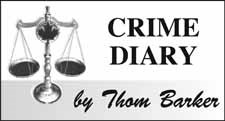I love the smell of 100-year-old newsprint in the morning. Last week as I was digging through our "newspaper morgue"-an activity that could consume all of my time if I didn't have stories to write-I came across the intriguing 1912 murder of Rev. Joseph Czerniawski.
Note: The Enterprise of the day had his name spelled at least three different ways in various articles, none of which corresponded to this spelling I found in the Dictionary of Canadian Biography Online (DCBO).
On or about March 17, 1912, Czerniawski's mutilated and dismembered corpse was found on the Grand Trunk Pacific Railway tracks near Goodeve. Subsequent forensic examination revealed Czerniawski had been struck in the head prior to being moved to the tracks, presumably in an effort by his murderer to obscure the evidence.
It seems the accused in the case, John Aurischuk (also DCBO spelling), had a beef with the priest-turned-farmer regarding the matter of his soul.
Justice moved fairly swiftly back in the day. Within a week of the murder a preliminary trial had been struck during which a local justice of the peace named Westbrook determined there was enough circumstantial evidence to proceed to trial.
At trial, presided over at Yorkton by Supreme Court Chief Justice Frederick W.A.G. Haultain-in those days the court had a special train at its disposal to travel the province-Czerniawski's wife testified about an encounter at her home between the two men. She said Aurischuk demanded that her husband return his soul. The accused claimed he was being prevented from praying to the Lord, she testified, and if his soul were not returned, Czerniawski's family would "be given cause to remember it."
A neighbour testified to a similar argument during which Aurischuk threatened to "fix" Czerniawski.
Two other witnesses said they had had conversations with Aurischuk during which he allegedly said killing the priest would be beneficial to the community.
And, although I couldn't find it reported in The Enterprise, the DCBO references two other incidents. In the first, Aurischuk had allegedly tried to stab Czerniawski while shouting, "give me back my soul." In the other he is reported to have declared that, "anyone who kills a priest like Czerniawski will be absolved of all his sins by God."
Further circumstantial evidence presented at the trial included the fact that the two men had been seen together the night of the murder and that Aurischuk lied to police about being at his brother's house at the time of the murder.
Police had also found a mitt that allegedly belonged to the defendant near where they thought the murder had been committed.
Of course, even a century ago on the frontier, circumstantial evidence needed to be corroborated by physical evidence.
The best physical evidence the prosecution had were blood stains found on the defendant's sleigh robes and clothing. Unfortunately for the prosecution, a laboratory expert from Regina testified the stains were pig's blood.
Finally, it seems Aurischuk had a pretty good lawyer. Mr. J.A.M. Taylor managed to get several pieces of key testimony tossed, including that of a Royal North West Mounted Police officer on the grounds the accused had not been properly informed of his rights.
A jury of 12 local men deliberated for five-and-a-half hours and acquitted Aurischuk exactly 100 years ago this month.
Justice Haultain discharged Aurischuk saying, "I trust you will go home and if you have any more difficulties or troubles with any one, you will settle them quietly and peaceably."
All told, the entire process had only taken eight months, virtually unheard of in today's courts for murder without a guilty plea. And, had Aurischuk been convicted, his punishment would have likely been just as swift.
In another murder case tried at the same sitting of the Supreme Court, Haultain passed a death sentence on Anton Luzinski for the murder in Melville of Paul Mohylinski. Luzinski was hanged February 10, 1913.




